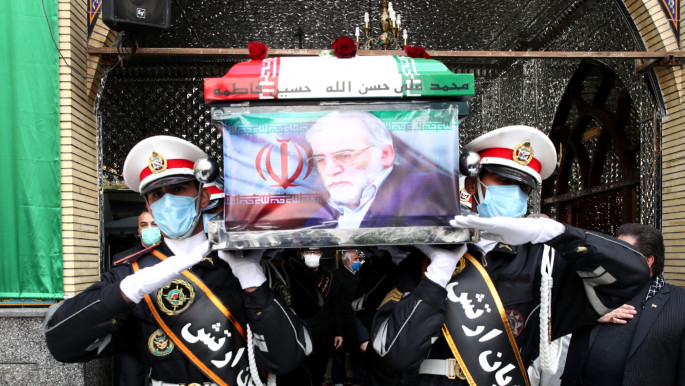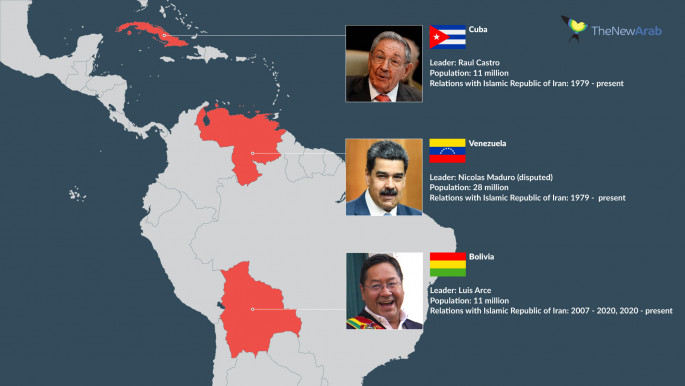What will Biden's presidency mean for Iran's influence in Latin America?
The beneficiary of this secretive deal was the US-sponsored, far-right Nicaraguan paramilitary group known as the Contras.
It was a sign that despite the fiery rhetoric of senior Iranian officials, the Islamic Republic's foreign policy would at times be guided by an unsentimental pragmatism.
Necessary friendship
These contradictions in Iran's foreign policy remain a highly-sensitive subject in the country today, according to senior researcher at the University of Oxford, Yassamine Mather.
"The Iranian government is very embarrassed by this and if you mention it you can get arrested," Mather told The New Arab.
With the US now the sole superpower in the world, socialist South American states Venezuela, Cuba, and Bolivia have set aside their ideological differences with Iran (including Tehran's crackdown on leftists) and formed a broad but informal "anti-imperialist" axis.
Fidel Castro's red carpet welcome to Tehran in 2001 was a culmination of these ties, which strengthened under conservative Iranian president Mahmoud Ahmadinejad.
 |
Iran's re-emergence on the American continent has become the focus of some attention in the US |  |
During his eight years as president, he guided Iran closer to leftist states in South America and pariah North Korea, as tensions with the US intensified following George W. Bush's "Axis of Evil" speech, and the 2003 invasion of Iraq.
"We are looking to the Ahmadinejad-era where very few countries wanted to have relations with Iran except for maybe Venezuela, Cuba and others," said Mather. "Ahmadinejad made a lot of efforts in cultivating these relations, meeting leaders at the edges of conferences and so on. I suppose it was desperation rather than by choice."
Although these friendships cooled during the early years of Hassan Rouhani's presidency, the issue has come to the fore again with new US sanctions on Iran and Venezuela.
Despite Venezuela boasting some of the largest oil reserves in the world, a crumbling oil infrastructure and US embargo has made Caracas reliant on Iranian gasoline imports as part of a barter-exchange system.
 |
|
| Fakhrizadeh's assassination: A new diplomatic obstacle for Biden's Iran policy |
May and September saw hundreds of thousands of barrels of oil shipped from Iran to the South American state, right under the nose of Donald Trump. The US has seized some of these shipments with profits from the sale of the oil cargo earmarked for a fund of American victims of terrorism.
On Monday, Reuters revealed that these exchanges between Tehran and Caracas have continued with an Iranian state-registered tanker facilitating the export of Venezuelan crude.
"That left them in the situation where Iran was selling these tankers full of oil to Venezuela. Whether this was something Rouhani wanted to do, or the IRGC (Revolutionary Guards) making the arrangements, I don't know, but clearly it highlighted economic desperation," said Mather.
Close relations with Cuba and Venezuela remain unpopular with many opposing political factions in Iran, said Mather. Conservatives view the friendship with non-Muslim, leftist governments with some embarrassment.
Read more: Faith and foreign policy - Inside Israel's battle for influence in Latin America
Reformists and moderates are seeking more lucrative ties with European states and are aware that Brussels has a negative view of the increasingly authoritarian and thuggish Maduro government in Venezuela. For both sides of the Iranian political divide, these clandestine dealings on oil appear more a sign of Iranian weakness than strength.
"Iran is, if you like, an unwilling partner in these alliances, and it is almost embarrassed that it has to do it. But, due to economic desperation, it has no choice," said Mather. "I don't see much enthusiasm in the right-wing press or among the reformist media for these relations."
|
|
This could be seen with Foreign Minister Mohammed Javad Zarif's recent visit to Bolivia, Cuba and Venezuela.
While the tour made headlines in the host states, it was dispatched to the discreet, inner sections of many partisan newspapers in Iran.
"For Zarif and Rouhani, their (foreign policy) preferences are European countries, Kerry, Obama and they are looking to the Biden presidency. So they didn't, if you like, volunteer the South America connection, they inherited it," Mather added.
"They were quite happy to continue these relations for economic reasons... due to sanctions."
Yet the cost of shipping oil half-way across the world has made many Iranians question whether there are tangible economic benefits for Tehran in these trades or if it is just another piece of high-drama propaganda for certain factions in Tehran.
Strategic value
Iran's re-emergence on the American continent has become the focus of some attention in US media outlets, alarmed at a perceived trans-continental, anti-US nexus emerging on America's doorstep. The US has attempted to counter Iran's influence there through sanctions on Hezbollah's contacts in South America.
Negar Mortazavi, an Iranian journalist and analyst, told The New Arab, that relations between Iran and several South American states have deepened again due to the Trump administration's sanctions strategy.
"Ties are mostly are based on resistance to US economic sanctions… but it is interesting that an Islamic, theocratic has forged ties with basically communist and not-so religious countries," Mortazavi said.
"From a distance, they look very different but when you see the basis of this relationship its basically their foreign policy and resistance to the United States."
 |
The US has attempted to counter Iran's influence through sanctions on Hezbollah's contacts in South America |  |
Cuba, Venezuela, and Iran have all faced new US sanctions in recent years, giving them a common goal in circumventing the economic embargoes. Access to the Americas has given Tehran a source of propaganda at home, amid a period of immense economic stagnation in Iran.
"This is on a smaller scale, but Iran is trying to build its influence and presence on America's backdoor. Obviously not as close as US bases in Qatar or Bahrain, but still, Venezuela is in the Americas," Negar Mortazavi said.
"Naturally this brings them together against a common enemy. It is also very practical because the US has limited their options of trade, so naturally they will gather together and trade because others won't," she added, noting the common sense of pride these governments have, in their independence from the US.
Military alliance
Yet the strategic doctrines of Iran and Venezuela remain very different, with North Korea remaining the Islamic Republic's more reliable military partner, said Arash Azizi, author of "The Shadow Commander: Soleimani, the US and Iran's Global Ambitions".
"Within the socialist states, Iran's most significant military help has come from North Korea, not Latin America… Cuba didn't give even the smallest help to Iran [during the Iran-Iraq war] despite having some capabilities at the time," he said.
The collapse of the Soviet Union in 1991 meant that Cuba lost its most important patron and no longer posed a threat to the US, while the bankrupt Venezuelan government is more concerned with domestic threats than external ones.
Yet the IRGC, which is the likely driver of Tehran's outreach to South America, sees strategic and economic benefits from the oil barter arrangement.
"The IRGC is now effectively the most significant part of Iran's armed forces so it will be involved in anything on such a degree," said Azizi
"In this case, it is working in tandem with the government and the state as a whole. The benefits are clear: making the Maduro regime more dependent on Iran, and also standing up to the Americans."
Of more concern for Washington are the activities of Iranian proxies, such as Hezbollah, in South America, where they have allegedly established criminal networks and extended their presence on the continent.
Hezbollah have also been accused of using Iranian diplomatic cover to attack Jewish cultural centres and Israeli missions in the past.
 |
Relations between Iran and several South American states have deepened again due to the Trump administration's sanctions strategy |  |
A tri-border area between Brazil, Argentina and Paraguay remains a hotspot for criminal gangs involved in the illegal weapons and drugs trade, money laundering, and smuggling, some with alleged links to Iran and Hezbollah.
"Iranian reporters, like Shahriyar Siyami, who went to Foz do Iguaçu in Brazil (a hub for the tri-country borderlands region) have reported open support of the Lebanese Shia there for Khamenei and Hezbollah, their pictures are widely displayed," said Azizi.
"My own work on Ecuador has shown significant Iranian and Hezbollah presence, including in the criminal underworld linked to casinos and drugs. The prosecutorial cases in Argentina and other countries show that Hezbollah and Iranians are involved in this world. So, there is no doubt that it exists."
Despite these shadowy activities, Iran's main policy objectives in South America for now appear to be diplomatic rather than military.
Iran scored another win this November when the new socialist government in Bolivia announced it was restoring full diplomatic ties with Tehran. Iran will also likely benefit from a détente with the new Joe Biden administration, meaning that the South America connection could again be put on the back burner by Tehran.
Negar Mortazavi said that a new nuclear deal with the US would likely dampen Tehran's desire to extend its influence in South America.
"Biden's plan of trying to return to the Iran nuclear deal, restart diplomacy, and re-establish diplomatic relations with Iran is very important and is going to change Washington-Tehran relations... [and] de-escalate the situation, which will also impact on Iran's ties with South American countries," said Mortazavi.
"Part of the Iran-Latin America axis is based on the strategic outlook and a fear of the threat of the US. So if that perception is reduced then it is going to change calculations in Tehran."
Paul McLoughlin is a news editor at The New Arab.
Follow him on Twitter: @PaullMcLoughlin





 Follow the Middle East's top stories in English at The New Arab on Google News
Follow the Middle East's top stories in English at The New Arab on Google News


